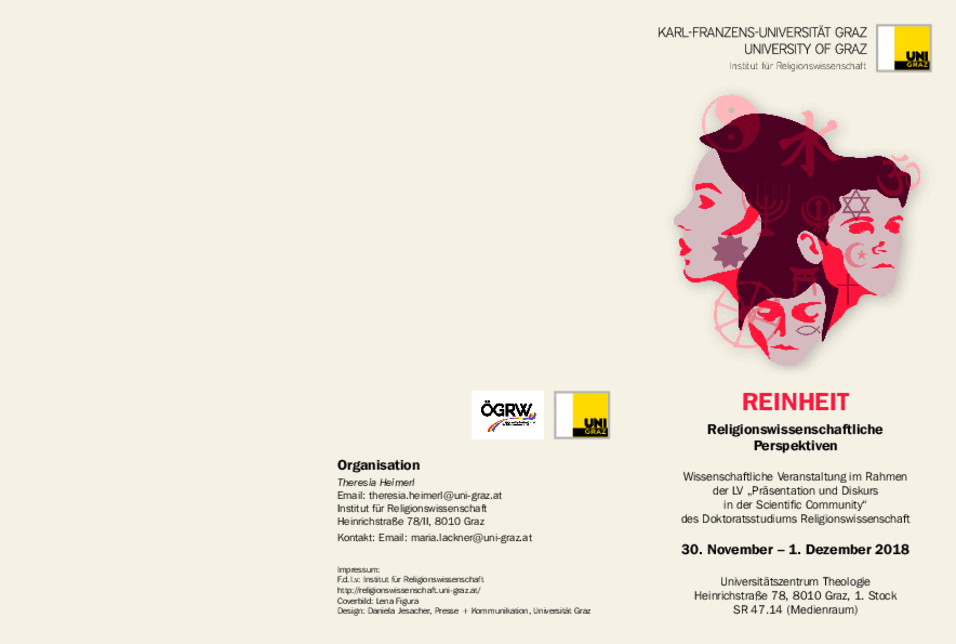Programm:
Freitag, 30. November 2018:
15:00-16:30 |
Eröffnungsvortrag: Un/Reinheit, Körper und Geschlecht mit anschl. Diskussion
Ao.Univ.-Prof.in Dr.in Birgit Heller
16:30-17:00 Pause
Chair: Ulrike Bechmann: Judentum
17:00-17:20
„Reiner Wein“ – Reinheitsvorschriften und aktuelle Weinproduktion im Judentum
Risopoulos
17:20-17:40
Koscheres Haar und Scheitelmacher – Haar-Regeln für Frauen im orthodoxen Judentum
Holzer
17:40-18:00
Reinheit in der Kabbala
Scrubei
18:00-18:30
Diskussion/Response zu den Referaten
Anschließend: Gemeinsames Abendessen
Samstag, 1. Dezember 2018
Chair: Karin Preisendanz: Asien I
9:00-9:20
Die Vier Aussergewöhnlichen Vorbereitenden Übungen als Methode der Reinigung im Tibetischen Buddhismus
Joos
9:20-9:40
Gibt es so etwas wie reines Fleisch?: Tibetisch-buddhistische Haltungen zum Fleischverzehr
Querl
9:40-10:00
Unreinheit und schöne Literatur: Leichenasche in der klassischen indischen Dichtung (Sanskrit und Prakrit, 1.-10. Jh.)
Ferstl
10:00-10:20
Purity of God and soul in the Indian philosophical tradition of Nyāya up to the 10th century CE
Kleczek
10:20-11:00
Diskussion/Response zu den Referaten
11:00-11:30 Pause
Chair: Franz Winter: Asien II
11:30-11:50
„Wie kann der Mensch rein werden? Wie kann der Schleier der Unreinheit gelüftet werden?“ (SGGS S.1). Reinheitskonzepte in der Sikh-Diaspora in Österreich
Wedech
11:50-12:10
Rituelle Reinheit als Voraussetzung der Kami-Verehrung: Konzepte der Verunreinigung und Reinigungsrituale im Shinto
Schilcher
12:10-12:30
Der Anfang muss rein sein. Feste und Zeremonien um Nyepi, das Neujahrsfest im Hinduismus balinesischer Prägung
Hammer
12:30-13:00
Diskussion/Response zu den Referaten
13:00-14:00 Mittagspause
Chair: Theresia Heimerl: Christentum (Parallelpanel zu Islam)
14:00-14:20
Reinheit der Seele als Motivation zur Ordensgründung
Frühwirth
14:20-14:50
Die Lilie als Symbol der Reinheit und ihre Verwendung in der christlichen Ikonographie
Krenn
14:50-15:10
Die Verkörperung von Reinheit in der Werbung
Czernin
15:10-15:30
Das Märchen KHM 31 (Mädchen ohne Hände) als ein Beispiel für Reinheit in den Märchen der Gebrüder Grimm
Pristavec
15:30-16:00
Diskussion/Response zu den Referaten
Chair: Karl Prenner: Islam (Parallelpanel zu Christentum)
14:00-14:20
Rituelle Un-Reinheit im Islam
Sharawi
14:20-14:50
Gebetswaschung im Islam
Legenstein-Berkembrock
14:50-15:10
Nahrung und Reinheit im Islam
Butorac
15:10-15:30
Diskussion/Response zu den Referaten
16:00-16:15
Zusammenfassung der Ergebnisse/Abschluss der Tagung

